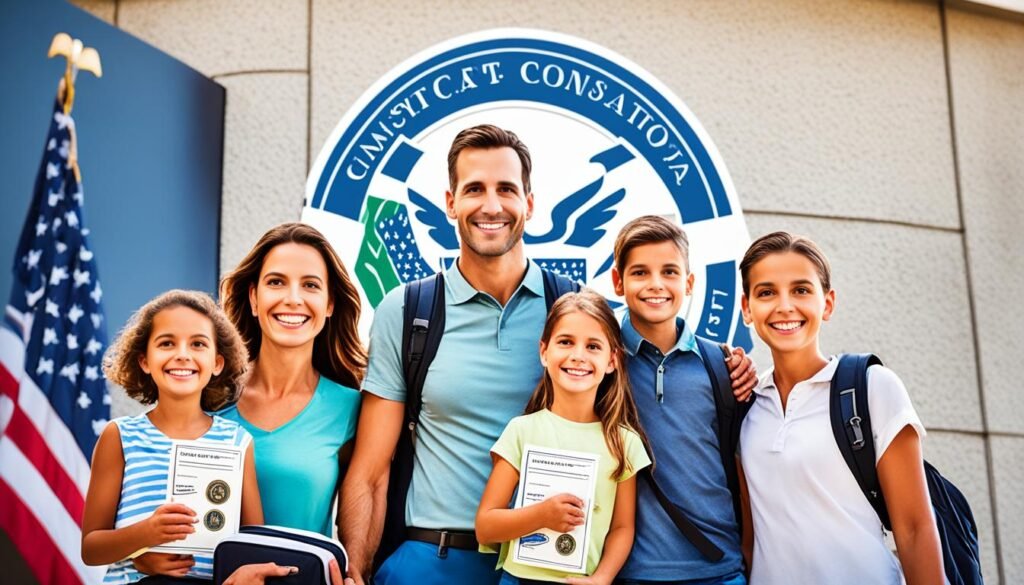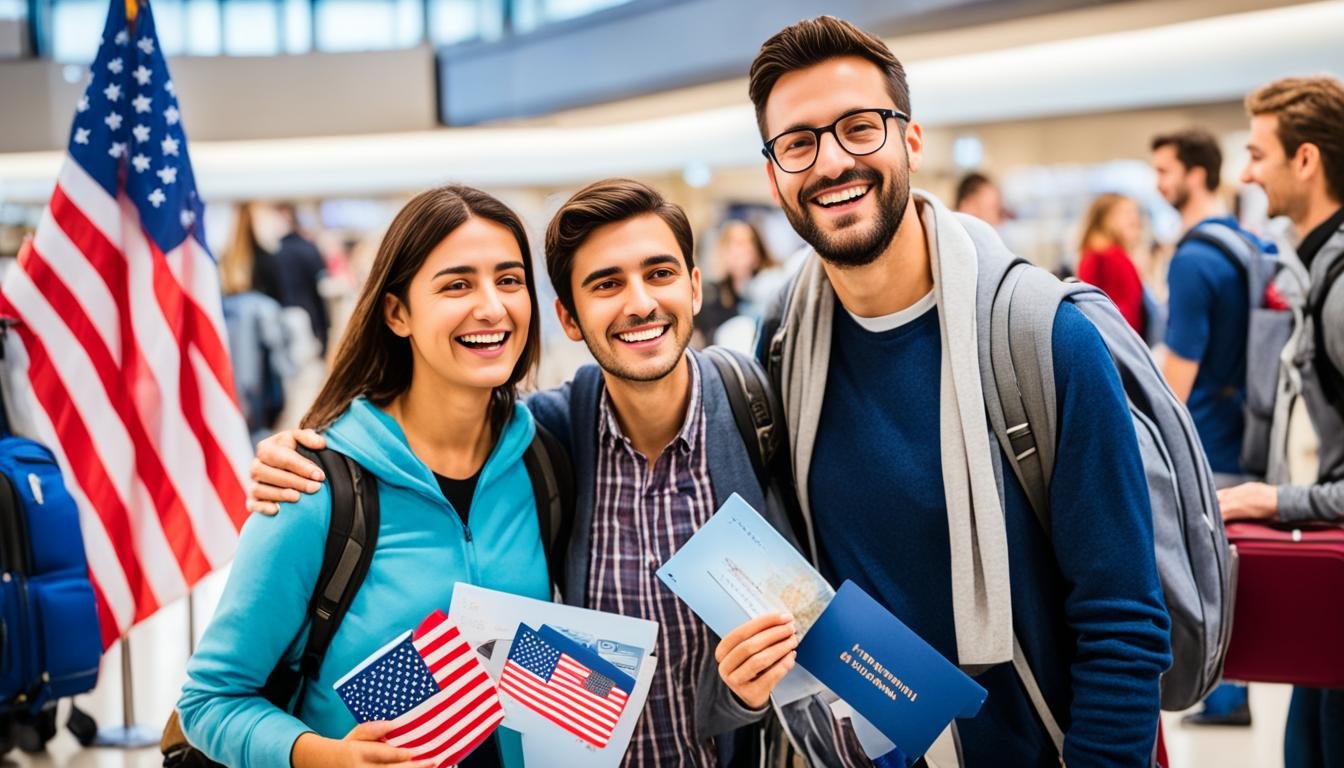Imagine the warmth of family close by as you traverse the challenging adventure of studying in the USA. You’re not alone in pondering whether you can bridge the miles and bring your parents to the USA while you study on a student visa. It’s a question that tugs at the heartstrings and nudges practicality. If the possibility of reuniting with your parents during your educational journey sparks a flicker of hope, you’re about to uncover the essentials that could turn that hope into a reality.
While your primary focus might be on securing a thriving academic future, there is a pathway that may facilitate a temporary reunion with your parents. The intricate web of immigration policies need not be a deterrent—with the correct information, bringing parents to the USA while you hold a student visa is within the realm of possibility. Delve into the guidelines, visa types, and requirements that dictate the delicate balance of studying in the USA and having your family by your side.
Key Takeaways
- Understand the options available for bringing parents to the USA while you’re on a student visa.
- Discover the nuances between F-1 and F-2 visas and the relevant B-2 tourist visa attributes.
- Gain insight into the documentation required to support your parents’ visa applications.
- Learn about the importance of demonstrating strong ties to one’s home country for visa approvals.
- Explore the financial aspects and responsibilities that come with having family in the USA while studying.
Understanding F-1 and F-2 Visa Regulations
As you embark on your journey as an international student, it’s imperative to comprehend the intricacies of U.S. visa regulations, particularly if you wish to have your loved ones join you. The F-1 visa allows you to pursue your studies, and the F-2 dependent visa enables your family to be by your side during this significant phase of your life. The visa application process is stringent, but with detailed guidance from your university international office, it becomes manageable.
Eligibility Requirements for F-2 Dependent Visas
Your aspirations to bring family members to the United States hinge upon securing F-2 dependent visas for them. This privilege extends to your spouse and children under the age of 21. As you formulate your plans, remember that dependents must exhibit verifiable ties to you, confirming your reciprocal relationship through formal documents such as marriage and birth certificates. Notably, while residing in the U.S., F-2 visa holders are not permitted to engage in employment and must demonstrate that they possess adequate financial resources for the duration of their stay.
Process of Securing I-20 Forms for Your Dependents
The pivotal first step to reuniting with your loved ones is obtaining the I-20 form, a critical document in the visa application process, which The Continents States University will be instrumental in issuing. You’ll be required to present a copy of your passport and proof of financial solvency. Once the I-20 forms are procured for your international student dependents, the gateway to applying for their F-2 visas swings wide open, moving your family one step closer to you and your educational ambitions in the U.S.
The B-2 Tourist Visa: A Path for Parents
If you’re an international student in the USA with a valid F-1 visa, the thought of having your parents visit you during your academic journey is both appealing and comforting. The B-2 tourist visa emerges as a timely solution for parents to be part of your educational experience in the States. This visa for parents not only offers the joy of family reunions but also a hassle-free way for them to enjoy visiting the USA.
Embarking on the B-2 tourist visa application process posits a straightforward pathway for your parents. Under this visa type, they are permitted to reside in the USA for the duration of the permitted stay which can be extended in six-month increments—giving ample time for parents to share in their child’s scholastic endeavors or to vacation in the country’s diverse landscapes.
However, obtaining a B-2 visa does necessitate a demonstration of the visit’s temporary nature. This involves illustrating sufficient ties to their home country to convince the authorities that their visit is indeed transient. Let’s breakdown what your parents need to prepare:
- Proof of a residence abroad to which they intend to return post-visit
- Evidence of economic, social, and familial ties to their home country
- A detailed itinerary of their stay, including the purpose of the visit and the timeframe
- Verification of funds to support their trip and ascertain that engaging in employment is not an objective
It is worth noting that while the B-2 tourist visa provides the flexibility your parents might seek during their time in the USA, it does not allow them to work while in the country. Hence, it’s crucial to have a financial plan for their visit and ensure a smooth stay.
Let your parents embrace the opportunity to witness your academic milestones and explore the cultural richness of the USA, through the B-2 tourist visa—a beneficial provision for families across the globe. Encourage them to take the first step towards a memorable visit that reinforces family bonds while respecting the immigration laws of the United States.

Inviting Your Parents to The Continents States University
As you delve into your academic journey at The Continents States University, it is natural to desire the presence of family to share in your educational milestones. Understanding the university’s supportive stance towards accommodating international students and their loved ones can offer a substantial relief. Specifically, when it comes to inviting parents, The Continents States University stands ready to assist with the university document requirements critical for a successful B-2 visa application.
The Continents States University’s Policy on International Students’ Relatives
Recognizing the importance of family support for international students, The Continents States University in Missouri fosters an inviting atmosphere for parents planning to visit. The university’s policy facilitates this by providing essential documentation and international office assistance, ensuring your loved ones can join you during your studies without unnecessary complications or delays.
Documents Required From The Continents States University’s International Office
In preparation for your parents’ arrival, there are certain documents that you will need to acquire from The Continents States University’s international office. These are not just mere formalities but pivotal pieces of evidence that substantiate the purpose and legitimacy of their visit:
- A copy of your I-20 or DS-2019 form, which verifies your enrollment and status as an international student.
- Proof of your academic standing and progression at The Continents States University.
- Documentation illustrating your capacity to financially support your parents during their stay, if applicable.
- An official invitation letter from The Continents States University extending a warm welcome to your parents.
Each document plays a crucial role in reinforcing the B-2 visa application, showcasing a clear itinerary, and providing peace of mind to the visa processing authorities that your family’s visit is well-intended and well-planned.
Guidance from The Continents States University’s international office is indispensable. Their knowledgeable staff can walk you through the intricacies of inviting parents, ensuring that each step aligns with visa policies and university regulations. By leveraging their expertise, you eliminate guesswork and pave a smoother pathway for your parents’ visit to the United States.
We encourage you to reach out to the international office as early as possible. This proactive approach will give ample time for document preparation and provide a buffer for any unexpected delays, ensuring your B-2 visa application process unfolds with efficiency and ease.
Financial Responsibilities for International Students and Their Parents
Embarking on an educational journey in Missouri comes with its unique set of financial requirements for international students and their parents. It is essential to demonstrate visa application funding evidence to ensure a smooth transition and to support your academic pursuits. Let’s delve into the crucial aspects of financial planning necessary for your time abroad.
Evidence of Funding for Dependents
When it comes to securing a visa for your dependents, presenting proof of adequate funding is non-negotiable. The International Student & Scholar Services (ISSS) at your university sets the minimum financial threshold that must be met. Your preparation in this respect can’t afford to be haphazard; you’re required to show at least $7,000 annually for your spouse and $6,000 annually for each child to receive an I-20 document. Despite these minimum figures, it’s prudent to consider the rising costs of living by allotting extra funds for unexpected expenses that may arise.
The Cost of Living and Studying in Missouri
Adjusting to the cost of living in Missouri is another layer of financial planning that you need to weave into your fiscal tapestry. While Missouri is known for being more affordable compared to other states, it is still vital to budget carefully. Typical expenses include accommodation, which may range from campus dormitories to off-campus apartments, groceries to stock your pantry, healthcare to keep you in good health, and other essential utilities.
At The Continents States University, bearing in mind studying expenses in addition to personal living costs is crucial. The university aids in painting a realistic picture of expected costs, aligning with visa regulations that mandate international students to maintain sufficient funds not just for schooling but also for any family members joining them.

- Develop a comprehensive budget for your educational and personal expenses.
- Consider the cost of textbooks, transportation, and personal indulgences when budgeting.
- Secure a financial buffer to cater for any unforeseen costs.
- Stay informed on current exchange rates, as they can significantly impact your budget.
Navigating Visa Applications Amidst COVID-19
The landscape of international travel has been dramatically altered due to the COVID-19 pandemic, presenting unique challenges and changes to visa applications and university enrollment procedures. As a student planning to study in the United States, it’s crucial to stay informed about the latest COVID-19 visa application updates and pandemic travel regulations to ensure a smooth transition to your academic pursuits.
Changes in Visa Application Procedures
Responding to the pandemic, visa application protocols have been updated to prioritize your safety and the safety of the campus community. The following are key updates you should be aware of:
- In-depth inquiries into university health protocols to safeguard student safety
- Proof of immunization, including full COVID-19 vaccination documentation
- Preparation to arrange comprehensive health insurance to meet university requirements for both students and their dependents
Keeping abreast of these changes can significantly enhance the success rate of your visa application during these unprecedented times.
Health and Safety Regulations at Universities in the United States
Universities across the United States, including The Continents States University, have implemented COVID-19 policies that might affect your visa application and your stay as an international student. To navigate these new regulations effectively:
- Directly contact The Continents States University to understand their specific health protocols and COVID-19 policies
- Assess any additional vaccination requirements that may be in place for your family or dependents
- Review the health insurance options being offered by the university or external providers to ensure they cover all necessary healthcare services during your stay in the country
Your proactive approach to understanding and complying with health and safety regulations is a testament to your commitment to both your education and the well-being of the entire academic community.
Nonimmigrant Intent: The Key to Visa Approval
Embarking on the journey to bring your parents for a visit to the United States while you pursue your studies is met with various requisites, but none hold as decisive a role in securing a B-2 visa as establishing nonimmigrant intent. This legal terminology may sound complex, but in essence, it encapsulates the applicant’s oath that their stay is temporary, with every intention to return to their native country following the visitation period.
During the consular interview, the most pivotal moment of the visa application process, a consular officer will meticulously assess your parents’ connection to their home country to confirm these ties are formidable and genuine. It’s imperative to approach this interview well-prepared with the necessary documentation that essentially serves as the passport to visa approval.
- Present proof of employment or business ownership abroad.
- Display documentation of property or investments in the home country.
- Highlight family ties, particularly those of dependents not traveling.
- Bring evidence of community and social connections that necessitate their return.
The ability to convey an authentic narrative illustrating these points is what will distinguish the application favorably in the eyes of the evaluating consular official. Remember that the demonstration of nonimmigrant intent is not merely a formality; rather, it’s a critical hurdle to overcome that can determine the outcome of the consular interview — and ultimately, the attainment of the B-2 visa.

Achieve success in this precise and demanding segment of the visa process by thoroughly preparing for the consular evaluation. With compelling proof and a persuasive presentation demonstrating unwavering ties to their homeland, your parents can look forward to joining you in the United States for a significant and joyous interval of your academic journey.
Prospective Length of Stay and Extensions for B-2 Visa Holders
When you embark on your travels to the United States with a B-2 visa, your journey begins at the port of entry, where an officer will determine the length of your stay. Typically, the initial B-2 visa stay can extend up to six months, offering a generous period to explore, spend time with family, or accompany a loved one for medical treatment. Yet, you might find yourself wanting or needing to extend your stay beyond this period.
Understanding the nuances of visa extensions is crucial. Should circumstances necessitate a longer visit within the U.S., you have the option to apply for an extension. This is not an automatic process, and you should take action well before your current authorized stay expires. Be proactive – apply for your visa extension with the United States Citizenship and Immigration Services (USCIS) using Form I-539, Application To Extend/Change Nonimmigrant Status.
- Gather documentation verifying the reason for your extension request.
- Ensure your passport remains valid for the duration of your intended stay.
- File the application at least 45 days prior to your visa expiration.
A favorable decision to extend your visit can grant you up to an additional six months in the United States, but approval is not guaranteed. The key is to present a compelling, honest argument for your need to extend your stay. Rest assured, every case is meticulously reviewed on its own merits.
Remember, whether at the port of entry or during your extension application, the demonstration of your nonimmigrant intent remains paramount. You must convince the authorities that you have solid plans to return to your home country following the conclusion of your visit.
- Prepare to evidence ties to your home such as a job, family, or property ownership.
- Show evidence that you have the financial means to support yourself during the extended stay.
- Have a clear plan for your extended time in the U.S. and be ready to articulate it.
By diligently following these steps and meeting the USCIS requirements, you stand a solid chance at receiving the time you need to fulfill the purpose of your visit to the United States.
The Importance of Proof of Ties to Home Country
When you embark on the B-2 visa application process, establishing strong ties to your home country becomes a cornerstone of successfully securing your travel to the U.S. Consular officers exert considerable scrutiny to ensure each visa applicant requirements are met, most notably through the demonstration of an unyielding connection to their place of origin.
What Constitutes Strong Ties?

Strong ties are personal and economic bonds that tie you to your home country and ensure your return after visiting the United States. Here are factors you should consider:
- Employment: A steady job in your home country suggests financial stability and a critical reason to return.
- Family: Immediate and extended family remaining at home can illustrate the depth of your personal connections.
- Property Ownership: Real estate or other significant assets in your home country can be powerful indicators of your intent to return.
- Social Ties: Your involvement in community activities, local organizations, or businesses can exemplify strong ties.
Preparing for the Consular Interview
The consular interview can appear daunting, but it’s your opportunity to present your case comprehensively. Preparing for this is pivotal:
- Gather all requisite documentation that proves your ties to your home country.
- Structure your narrative cohesively to detail your reasons for visiting and strong incentives to return home.
- Ensure you are clear about the legal status of your student child in the U.S., as well as your financial and logistic arrangements for the trip.
Remember, demonstrating nonimmigrant intent and ironclad ties to your home country is imperative during the consular interview. The ability to show these ties can make the difference between a B-2 visa approval and a denial. Therefore, thorough consular interview preparation must top your list of priorities as you navigate through the B-2 visa application process.
Health Insurance and Medical Coverage in the United States
When you decide to bring your parents to the USA while you’re studying, it’s imperative to address their health insurance needs. Medical care in the United States can be prohibitively expensive without adequate coverage, and as visitors on a B-2 visa, your parents won’t be eligible for benefits like Medicare. Consequently, purchasing comprehensive health insurance is a critical step in ensuring their well-being and safeguarding against unforeseen medical expenses.
Here’s what you need to consider while exploring health insurance options for your parents:
- Short-term medical insurance designed for tourists can be a suitable option – it covers emergencies and acute illnesses that may arise during their stay.
- Look for policies that provide substantial coverage with minimal exclusions, ensuring common medical issues that your parents might face are covered.
- Understand the difference between “Fixed Coverage Plans” and “Comprehensive Coverage Plans”. The latter typically offers a broader range of services and better benefits, which might be more suitable for longer stays.
- Ensure that the insurance plan is accepted by a wide network of hospitals and clinics throughout the USA, especially those close to your location.
- Review the claim process for each insurance policy, as some can be complex and time-consuming, which could add stress during emergencies.
- Consider the policy’s start date to coincide with their arrival to ensure immediate coverage.
Persuasive planning and research into health insurance options will not only give you peace of mind but also demonstrate to consular officers that you are taking the necessary steps for a well-prepared visit for your parents. Remember, a good insurance policy can prevent medical bills from escalating and ensure your parents have access to the care they need while in the United States.
Limitations of B-2 and F-2 Visas: Education and Employment
When you or your loved ones are exploring the benefits of B-2 and F-2 visas, it’s vital to understand the limitations tied to educational pursuits and employment rights. These visas are designed to foster family unity while respecting the regulatory frameworks set forth by U.S. immigration policies. Understanding these restrictions is crucial to maintaining legal status and planning your family’s time in the United States effectively.
While holding a B-2 visa, your parents may engage in leisure travel and partake in the enriching cultural experiences the U.S. offers. However, their ability to pursue studies is restricted. Short recreational courses, such as a two-day cooking class, may be permissible under a B-2 visa, but it prohibits enrollment in a course of study that leads to a degree or academic certification. As for employment, the B-2 visa does not authorize any form of work, whether it’s paid or unpaid.
Dependents on an F-2 visa, including your spouse and children, face similar constraints. Primary and secondary education for children is permissible; however, adult dependents are not permitted to engage in full-time study. Advanced education, including college or vocational programs, is beyond the scope of the F-2 visa’s educational allowance and requires a change of status to a student visa. Employment prospects for F-2 visa holders are also non-existent, and any intention to work would necessitate a separate employment-authorized visa.
It’s key for you, as an international student or visitor, to operate within the legal parameters of your visa classification. If your aspirations or those of your family members evolve while in the U.S., it’s imperative to consult with immigration experts or university advisors to explore options for adjusting your immigration status.
- B-2 Visa Restrictions:
- No enrollment in a course leading to academic credit.
- Prohibited from all forms of employment.
- May participate in recreational studies that don’t provide a degree or certification.
- F-2 Visa Restrictions:
- Children may attend K-12 schools.
- Adults cannot pursue higher education without changing to a student visa.
- Holding an F-2 visa does not grant permission to work in the U.S.
Conclusion
As you navigate the complexities of bringing your parents to the USA while you immerse yourself in studies, it’s imperative to arm yourself with the right information to facilitate their visit. Understanding the nuances of F-1 and F-2 visa regulations is foundational, particularly the synergetic roles they play in keeping families connected across borders. Equally essential is grasping the purpose and limitations of the B-2 tourist visa, a beacon of hope for parents aiming to provide support and companionship during their child’s educational pursuit in the United States.
The Continents States University stands as a testament to the vibrant international community it fosters, offering no exams and no live lectures within its entire degree programs – a policy that extends to its international office’s robust support system for overseas students. This backing proves invaluable, especially when it comes to the logistics and documentation needed for parents’ successful visa applications. Your proactive collaboration with the university and your attention to the financial planning for living costs in Missouri will set a solid groundwork for your dependents to join you.
Perhaps most critical in this process is the demonstration of nonimmigrant intent to consular officers. The clear establishment of a temporary visit allows parents to stand by their children in the United States, broadening their horizons to the familial experiences unique to this cultural melting pot. With this guidance, your journey to bringing your parents to the USA, while abiding by the nuances of visa regulations, should tread a path of clarity and success.


